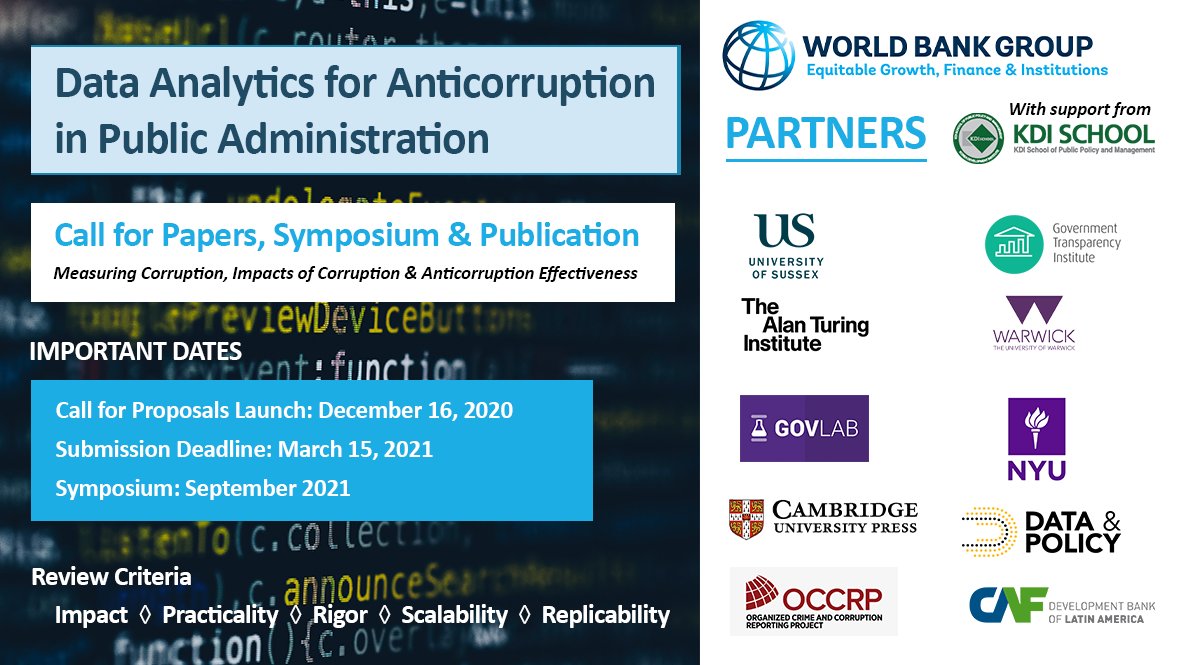
The CSC is cooperating with the World Bank and other academic and development partners to solicit ideas for using data analytics as an anti-corruption tool in public administration. In this post, CSC Director Liz David-Barrett explains how such tools might help policy makers.
Policy makers have a very specific relationship with data. They are interested in the academic question of whether a policy works, but they also need evidence that can be generated quickly and cheaply, and which tells a clear story about impact or contribution. They use this evidence to justify decisions – for example, to decide when to adapt and change tack and whether to continue an investment – or cancel it.
Policy makers working on corruption face particular problems. In other areas of policy making, impact evaluation is fairly well developed and is used to design policies as well as to review and reform them. But it relies on good measurement of the variables that you are trying to influence. With corruption, the difficulty of measuring the problem in the first place is compounded by the difficulty of analysing how one particular intervention has contributed to change (or the absence of change).
This means that policy makers are often very frustrated. They face criticism from peers that they have invested vast amounts of money in anti-corruption tools, but how do they know whether they are having any impact?
The Governance Global Practice (GGP) of the World Bank is developing data analytic tools to enhance the analysis and measurement of corruption as part of its new Anticorruption Initiatives. The Bank aims to take advantage of the growing availability of data to develop a stronger evidence base for policy reform with insights that reflect the nature of corruption problems and their impacts across different levels of government, sectors, and contexts.
As part of this initiative, we at the Centre for the Study of Corruption are partnering with the Bank and other academic and development organisations – including the Korea Development Institute School for Public Policy and Management – on a research program to advance data analytic research methods and knowledge in the measurement and analysis of corruption. The research program encompasses a call for papers, to be followed by a symposium, which will provide a platform for governments to share their experiences innovating in anticorruption data analytics. The program will culminate in a special collection of articles in Data & Policy, a peer-reviewed, open-access journal published by Cambridge University Press.
The call asks for papers on four core areas:
1. New data-driven approaches to detecting and measuring corruption.
2. Using new data sources and methods to measure the impacts of corruption.
3. Using open data to assess the effectiveness of anticorruption tools, policies, and interventions.
4. Contributing new knowledge that assists policymakers and researchers in addressing and overcoming ethical and technical challenges associated with data quality, privacy, and access issues in the anticorruption field.
The ultimate goal of the program is to advance anticorruption data analytics to inform more effective policies and actions by governments for greater accountability in public administration.
There are four areas where I think we particularly need contributions:
First, policy makers that are tackling corruption often don’t know which aspect to tackle first. Can we offer insights into how to sequence policies or use intermediate steps towards a big objective?
Second, policies to combat crime and corruption often have unintended consequences, where the corrupt actors simply start exploiting new loopholes. How can we measure these displacement effects?
Third, quantitative approaches are great for uncovering patterns, but do not always do justice to the complexity of corruption. How can we bridge the divide between quantitative and qualitative methods?
Finally, policy makers need to think about the social impact of policies, such as how they affect different groups in society. How can we measure how anticorruption policies interact with gender, ethnicity and income levels?
Please check out the call for papers and get creative!
This initiative is in collaboration with the following partners, as well as those already mentioned:
The Government Transparency Institute


Leave a Reply